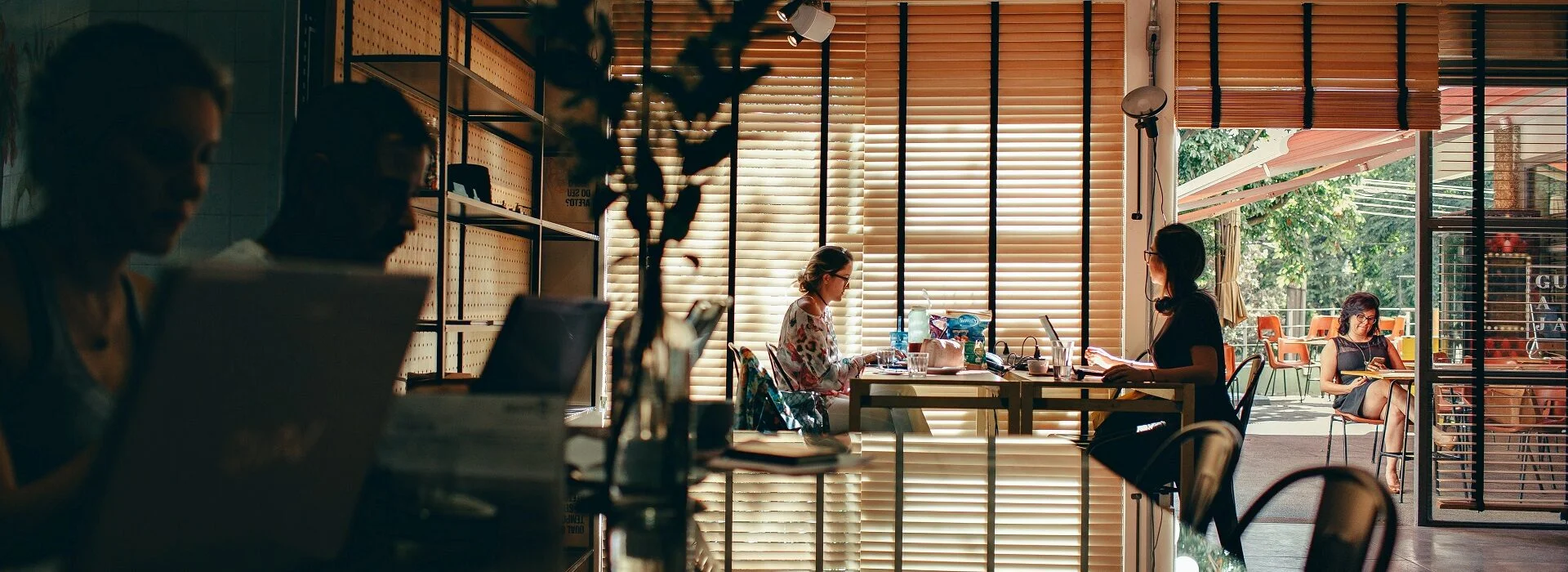 AI V HRInspirace
AI V HRInspiraceWork-Life Balance v novém normálu
Náhlá změna v našem pracovním prostředí nás všechny více či méně překvapila. S nárůstem požadavků na stejně dobrý výkon v novém normálu čelíme výzvě, jak si udržet duševní a fyzickou pohodu. Jaké způsoby můžeme využít ke zlepšení naší každodenní práce a života?

Autor: PhDr. Iva Linda Maruščáková & Mgr. Lea Jakob – 22/11/2021
614 dní. Počet dní, které jsme prožili od začátku prvního lockdownu v České republice – a náš nový způsob života a práce, který s sebou přinesl. Hodně se mluvilo o tom, jak bychom měli udržet „novou“ rovnováhu mezi pracovním a soukromým životem. Ale jak napsal Matt Haig na Twitteru – neměli bychom především zapomínat, že to, jak jsme pracovali před Covidem, nebylo pro většinu z nás zrovna vynikajícím příkladem Work-Life Balance:
„Lockdown představoval obrovskou výzvu pro duševní zdraví. Ale náš „normální“ svět dlouhé pracovní doby, stresujícího dojíždění, přetížených životů, hektických davů, nákupních center, nesmyslných schůzek, ekologické destrukce a všeho 24/7 byl jen stěží utopií pro duševní zdraví. Nový normál, prosím.“
Matt Haig, 2021
Pohled na náš život optikou pozitivního přístupu Covid nabídl většině z nás skvělou možnost hledat – a najít – vlastní a možná i lepší systém Work-Life Ballance.
ZDE JE NĚKOLIK TIPŮ, KTERÉ SOUČASNÉ STUDIE A PŘÍSTUP NAŠICH KLIENTŮ ODHALUJÍ JAKO NEJEFEKTIVNĚJŠÍ CESTU PŘI JEHO VYTVÁŘENÍ:
TIP 1:
Zaměřte se na řešení, nikoli na negativní emoce: Používání přístupu pozitivní psychologie, stejně jako racionálního přístupu, nám pomáhá získat kontrolu nad situacemi, kde jsme ji částečně ztratili – jako v případě Covidových časů a našeho dříve používaného přístupu Work-Life Balance.
TIP 2:
Používejte různé denní rozvrhy pro režim v kanceláři, vzdálený režim a hybridní režim – nikdy nepoužívejte pro všechny stejný – buďte flexibilní a chytří: Důvod je velmi jednoduchý: různé situace jsou pro nás výzvou s různými potřebami a úkoly.
TIP 3:
Informujte se o nových způsobech plánování a odpočinku. Nedávný výzkum ukázal, že lidé, kteří pracují v domácím kancelářském prostředí, mají tendenci pracovat více a méně plánovat přestávky. Ukázalo se, že 5-10minutové přestávky každých 50-60 minut jsou účinným způsobem, jak zajistit rychlou obnovu našeho soustředění a sil. Tyto účinky neplatí pro 20minutové přestávky po 2 hodinách práce. Delší přestávky trvající přibližně 30 minut se doporučují po 2-4 hodinách práce.
Podle této studie jsou pro odpočinek během práce nejúčinnější následující činnosti:
- Fyzická aktivita: zvyšuje průtok krve do oblastí mozku, které se podílejí na soustředění.
- Meditace: odpojuje od myšlenek souvisejících s prací a zvyšuje soustředění
- Učení se něčemu novému, hry: zvyšuje motivaci a sebevědomí
- Pomoc druhým: zvyšuje solidaritu a pozitivní emoce
- Stanovení nového cíle (cílů) a plánů do budoucna: umožňuje odpoutat se od detailů a vnímat širší souvislosti
TIP 4:
Nové způsoby odpočinku: Spánek a produktivní zdřímnutí. Hluboká regenerace posiluje schopnost zvládat každodenní výzvy, být duševně vyrovnaný a dosahovat výsledků: regeneruje se schopnost udržet pozornost, logické myšlení a další kognitivní funkce, které využíváme při plnění pracovních úkolů.
Podřimování v pracovní době: je nový přístup, ideální k vyzkoušení během home office.
Jak na to:
- Stanovte si pro něj v kanceláři pravidla (s nadřízeným a kolegy).
- Najděte si tiché a klidné místo
- Nezdřímněte si déle než 20 minut + 10 minut na odpočinek.
- Ideálně podle biorytmu mezi 2. a 4. hodinou odpoledníet rules for it in the office (with your boss and colleagues).
TIP 5:
Pracujte v rámci mezí: nejen ve vztazích, ale také ve svém fyzickém prostředí a rolích.
„Brány“: symbolické hranice v podobě čáry nebo prostého zavření/otevření dveří pomáhají našemu mozku přepnout z práce na odpočinek a naopak.
TIP 6:
Využívejte tipy pro zvýšení produktivity:
Ekonomika pozornosti: Náš čas je dnes považován za ekonomickou kategorii (ekonomika pozornosti): inzerenti platí za naše zhlédnutí, náš zaměstnavatel nás platí za náš čas, my platíme za něčí čas (např. masáž nebo opravu notebooku).
Uvědomění si vlastní pozornosti: Poměrně často víme, které úkoly musíme udělat, ale snadno se necháme rozptýlit. Myslíme si pak, že jsme tak zaneprázdnění a naše dny jsou příliš krátké. Ve skutečnosti však nejsme produktivní. Chybí nám uvědomění si toho, čemu věnujeme svou pozornost.
V čem tedy spočívá produktivita? Být produktivní znamená, že víme, co je třeba udělat, a uděláme to v reálném čase.
ZLATÝ TIP NAVÍC PRO PRODUKTIVITU V NOVÉM NORMÁLU: META-VĚDOMÍ.
Na začátku si můžeme velmi málo uvědomovat, jak moc ztrácíme pozornost. Je dobré vzít si 60minutový časový rámec, po jehož uplynutí máme časovač, a zeptat se sami sebe: „Na co jsem se v uplynulé hodině soustředil? Vím to? Soustředil jsem se na to, co jsem chtěl, nebo moje pozornost přeskakovala mezi různými věcmi a úkoly?“.
Když si lépe uvědomíme (nebo jsme v přítomnosti), na co se soustředíme, můžeme se snažit přesměrovat své zaměření na to, co je důležité. K tomu vám pomůže, když si povedete seznam věcí, které odvádějí vaši pozornost.
TIP 7:
Odpočívejte chytře: Mindfulness a meditace: Způsob myšlení, při kterém si uvědomujeme přítomný okamžik. Změny, které přináší mindfulness, jsou přímo pozorovatelné a měřitelné i při zobrazování magnetickou rezonancí (rozsvítí se centra pro pozitivní emoce). Lze je pravidelně rozvíjet.
TIP 8:
Pracujte se svým osobním myšlenkovým nastavením na změnu: Mnozí z nás mají tendenci vyhledávat podmínky, které jsou pro nás dobře známé a předvídatelné. Pokud nám je někdo vezme, řekněme s Novým normálním způsobem života, a podmínky našeho každodenního života se změní tak, že se náš život náhle stane neznámým a nepředvídatelným, máme tendenci reagovat tak, abychom změnu odstranili.
Jak to můžeme v New Normal a jeho nových výzvách dělat ještě lépe?
- Mindset 1: jediná jistá věc je změna. A my se jí musíme přizpůsobit.
Nemůžeme předvídat, kam nás budoucnost zavede. Všichni můžeme aktivně pracovat na tom, abychom se přizpůsobili – a v řízení změn je otevřenost vůči nevyhnutelným změnám a adaptace základním přínosem těch, kteří žijí svůj život úspěšně a spokojeně.
V případě covidu to znamená počítat s možností, že nový covidový stav nouze může kdykoli nastat znovu. - Mindset 2: Změna nás v životě posouvá kupředu.
Bez změny bychom nebyli tam, kde jsme nyní – to je dobré si uvědomit. - Mindset 3: Změna může mít i pozitivní efekt.
Možná jste již čelili situaci, kdy jste museli projít nepříjemnou změnou, a zpětně jste si říkali „proč jsem to neudělal dříve?“.
Covid nás donutil hodně přemýšlel o nás samotných a o nových přístupech k práci. Mindset 1: the only certainty is change. And we must adapt to it.
TIP 9:
Udržujte život jednoduchý: Minimalita je nový normál. Nevěnujte příliš mnoho času přehnanému analyzování situací. Učte se rychle ze svých chyb. Dlouhé přemýšlení o situaci, které není zaměřeno na řešení, nám energii spíše bere, než poskytuje.
Soustřeďte se na řešení a možnosti, které jsou k dispozici. Zjednodušujte, kdekoli a kdykoli je to možné.
TIP 10:
Využívejte principy pozitivní psychologie. Základní premisou je, že každý z nás má ve svých rukou kontrolu nad tím, zda bude pociťovat pozitivní nebo negativní pocity. Výzkum ukázal, že můžeme aktivně měnit stav, jak se cítíme. Abychom si to usnadnili, můžeme se začít těšit na změnu místo toho, abychom se jí báli.
„CO BYSTE UDĚLALI, KDYBYSTE SE NEBÁLI?“
Zakončeme naše tipy a triky touto větou, která vás může dovést dál v procesu mentorování, nejen při vytváření nejlepšího systému Work-Life Balance.

